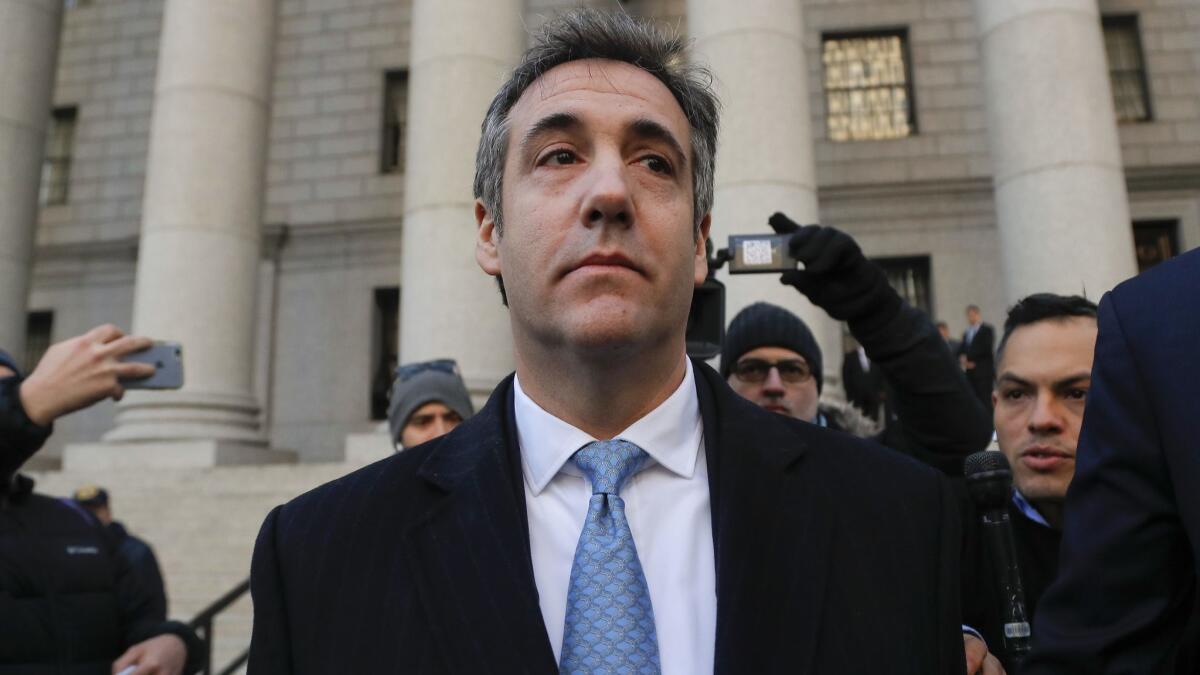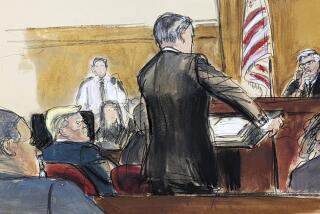With illegal hush-money payments, ignorance could be legal bliss for Trump
President Trump has never been shy about his ignorance.
He claimed that “nobody knew healthcare could be so complicated.” He says he trusts his “gut” over established science on climate change. He routinely mangles basic facts about the U.S. economy, military and foreign alliances.
But ignorance may be Trump’s best defense in the investigation that now poses the most direct legal threat to him, a probe into payments to two women to buy their silence in the final weeks of the 2016 presidential campaign.
Although the Russia investigation led by special counsel Robert S. Mueller III has gotten more attention, federal prosecutors in Manhattan pursuing a separate case have said the president directed an illegal scheme committed by his longtime lawyer, Michael Cohen, who is scheduled to be sentenced on Wednesday.
The U.S. attorney’s office said in a court filing that Trump, referred to as “Individual-1,” directed Cohen to pay $280,000 to two women in an illegal effort to sway the election. The money went to Karen McDougal, a former Playboy playmate, and Stormy Daniels, a porn star, to keep them quiet about their claims of affairs with Trump years ago.
If prosecutors want to target Trump — presumably after he leaves office since Justice Department rules bar indicting a sitting president — they must prove not only that campaign finance laws were broken but that Trump knew he was breaking them.
“If he truly had no idea what he was suggesting was improper, that can be an escape hatch,” said Jessica Levinson, a Loyola Law School professor who specializes in election issues.
Follow the latest news of the Trump administration on Essential Washington »
In most criminal cases, ignorance of the law is no defense. But campaign laws are different. They require a defendant acted “knowingly and willfully” to violate the law, a tougher standard that may play to Trump’s advantage.
“There are certain kinds of crimes, like armed robbery, where we expect everyone knows it’s against the law to go into a bank with a gun and get money,” UC Irvine election law professor Richard L. Hasen said. “But there are other kinds of legal violations where it only becomes a crime when you do it willfully.”
Prosecutors would also need to prove that Trump wanted the payments made for a political purpose rather than to simply avoid embarrassment.
The president is already honing his defense on Twitter. On Monday morning, he described the payments as “a simple private transaction” and criticized Democrats who “wrongly call it a campaign contribution.”
He also suggested that Cohen may be the only one at fault for not handling the transaction in a legal way, writing that it’s the “lawyer’s liability if he made a mistake, not me.”
Cohen pleaded guilty in August to, among other crimes, two counts of violating campaign finance laws by exceeding contribution limits and prohibitions on corporations donating directly to candidates.
Daniels received $130,000 directly from Cohen, who used a shell company to pay her. McDougal was paid $150,000 by the company that publishes the National Enquirer, which is run by a Trump ally.

Trump has a history of lying about the payments. He previously denied knowing about the payment to Daniels, only to eventually admit that he had reimbursed Cohen for it.
New facts could still bolster prosecutors’ contention that Trump directed Cohen’s work or that he knew the payments were violating the law.
Unless that happens, however, the president’s defenders say he’s in the clear.
“There’s no evidence the president authorized an illegal act,” said Joseph diGenova, a former U.S. attorney in Washington. “The direction of the payment of hush money is not a crime.”
The clearest parallel case is the 2012 prosecution of John Edwards, the former senator from North Carolina. He was accused of using nearly $1 million from donors to prevent his pregnant mistress from going public during his failed run for the Democratic presidential nomination in 2008.
Edwards argued that the payments were intended to prevent his wife from discovering the affair, not for a political purpose. A jury acquitted Edwards on one charge and deadlocked on five others, a sign of how difficult such cases can be.
“It depends on whether the payment, whether it’s hush money or anything else, was made with the intent of influencing the election,” said Daniel Petalas, a former acting general counsel at the Federal Election Commission and public corruption prosecutor at the Justice Department.
Paul S. Ryan, a vice president at Common Cause, an election watchdog group, said Trump could face a stiffer challenge. Daniels and McDougal were paid years after the alleged affairs but less than a month before election day in 2016, suggesting the payments were directly tied to the election.
Several legal experts said Trump faces a serious threat in the hush money case.
“They are clearly going after the president on campaign finance violations,” Andrew McCarthy, a conservative writer and former federal prosecutor, said on Fox News on Sunday. “It’s clear that Trump is the target and he’ll be indicted eventually.”
Justice Department guidelines say a president cannot be indicted while in office, but he could be charged after leaving the White House. The statute of limitations is five years, meaning Trump’s legal exposure could increase if he doesn’t win reelection.
Given the need to prove Trump’s intent and his understanding of the law, collecting evidence could be a challenge. The president has famously called himself “not a believer in email,” and he’s not known for texting unless he is broadcasting his thoughts on Twitter.
But prosecutors told U.S. District Judge William H. Pauley III in August, when Cohen pleaded guilty, that they could prove the money was spent “in coordination with the campaign or candidate for purposes of influencing the election.”
Cohen, who long served as Trump’s personal attorney and private fixer, appears willing to testify against him. In addition, he secretly recorded some phone calls with Trump, recordings that the U.S. attorney’s office now possess.
One recording, leaked to the news media in July, revealed a conversation between Cohen and Trump about a payment to McDougal.
Prosecutors clearly are focused on how the money was used for political purposes.
“While many Americans who desired a particular outcome to the election knocked on doors, toiled at phone banks, or found any number of other legal ways to make their voices heard, Cohen sought to influence the election from the shadows,” they wrote in a memo recommending up to four years in prison for Cohen.
“He did so by orchestrating secret and illegal payments to silence two women who otherwise would have made public their alleged extramarital affairs with Individual-1. In the process, Cohen deceived the voting public by hiding alleged facts that he believed would have had a substantial effect on the election.”
The end game may not be a criminal case against Trump.
The U.S. attorney’s office in the Southern District of New York “is outlining what it believes to be its case for impeachment,” DiGenova said. The court filings, he said, are “designed for the House of Representatives,” which would consider any articles of impeachment.
Democrats are definitely watching. Rep. Jerrold Nadler (D-N.Y.), incoming chairman of the House Judiciary Committee, where any impeachment proceedings would begin, described the hush money allegations against Trump as “impeachable offenses.”
“Whether they are important enough to justify an impeachment is a different question,” Nadler added.
Twitter: @chrismegerian
More to Read
Get the L.A. Times Politics newsletter
Deeply reported insights into legislation, politics and policy from Sacramento, Washington and beyond. In your inbox three times per week.
You may occasionally receive promotional content from the Los Angeles Times.







